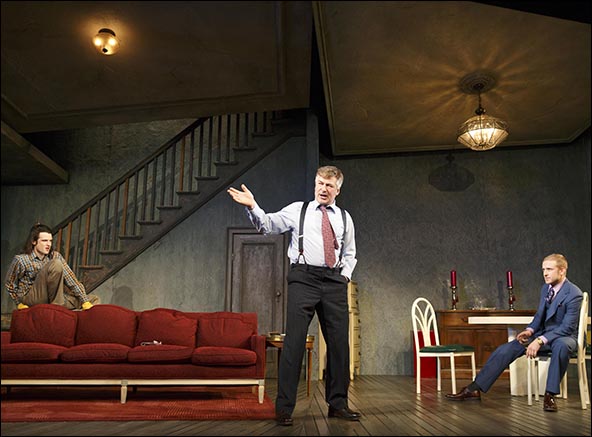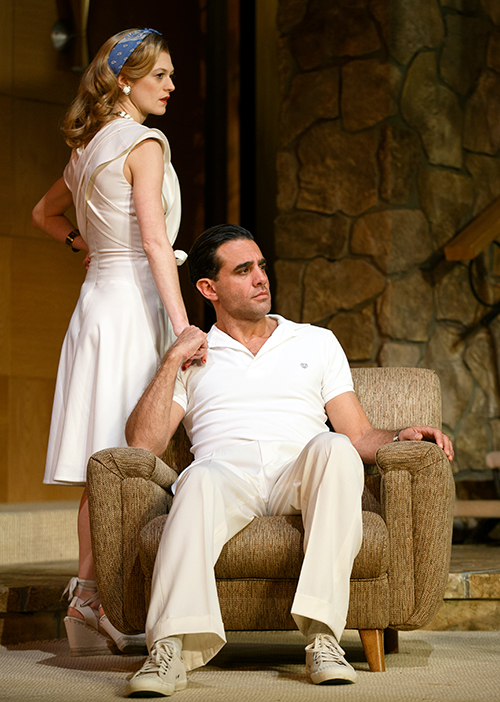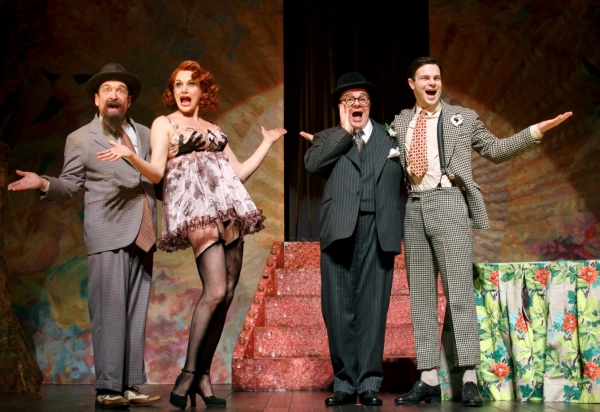In the third of this week’s Wall Street Journal drama columns, I review the Broadway premiere of Orphans and a revival of (eeuuww) Jekyll & Hyde. Here’s an excerpt.
* * *
Alec Baldwin’s self-transformation into a character actor is one of the most sensible and honorable things that a fading movie star has ever done. It’s also made him available for occasional stage appearances in New York, most recently in the Roundabout Theatre Company’s well-meaning but unsatisfactory 2006 revival of Joe Orton’s “Entertaining Mr. Sloane.” Now Mr. Baldwin is back in town with a better show. “Orphans,” Lyle Kessler’s 1983 play about a shady businessman who takes two down-at-heel brothers under his wing, has finally made it to Broadway after being mounted by just about every regional theater in America. It’s become a dismayingly rare pleasure to see a serious play on Broadway, and though this revival, like “Orphans” itself, is far from perfect, it’s still very much worth seeing.
 “Orphans” is the kind of show in which you’re not supposed to be completely clear about what’s happening onstage, or at least about what it means. Treat (Ben Foster) and Phillip (Tom Sturridge) live together in a crumbling row house in Philadelphia. Treat is a knife-wielding, near-psychopathic thug, Phillip a mentally disturbed child-man who never leaves the house and is wholly dependent on his brother. Treat runs into Harold (Mr. Baldwin) in a bar, gets him drunk, and lures him back to the house in order to hold him for ransom. Instead the smooth-tongued Harold turns the tables by hiring the brothers as his bodyguard-assistants and setting himself up as their father figure…
“Orphans” is the kind of show in which you’re not supposed to be completely clear about what’s happening onstage, or at least about what it means. Treat (Ben Foster) and Phillip (Tom Sturridge) live together in a crumbling row house in Philadelphia. Treat is a knife-wielding, near-psychopathic thug, Phillip a mentally disturbed child-man who never leaves the house and is wholly dependent on his brother. Treat runs into Harold (Mr. Baldwin) in a bar, gets him drunk, and lures him back to the house in order to hold him for ransom. Instead the smooth-tongued Harold turns the tables by hiring the brothers as his bodyguard-assistants and setting himself up as their father figure…
For all the fluency of its craftsmanship, “Orphans” gives the impression of having been knocked together out of spare theatrical parts. Not only is its premise self-evidently derived from Harold Pinter’s “The Caretaker,” but Mr. Kessler has pinched other elements of the play from sources as diverse as “The Glass Menagerie,” “Our Town” and Sam Shepard’s “True West.” But it’s still an exceptionally effective vehicle for three strong actors, and Mr. Baldwin is both strong and moving…
Even as the gods themselves are said to inveigh in vain against stupidity, so do drama critics the world over inveigh no less vainly against “Jekyll & Hyde,” the wretched 1990 Leslie Bricusse-Frank Wildhorn musical that ran on Broadway for four years, after which it triumphantly toured the known universe, proving yet again that you can fool some of the people all of the time. Now it’s back on Broadway again, this time in a new roadshow revival that has paused in its travels for a two-month run at the Marquis Theatre.
No matter who’s doing it or where it’s being done, “Jekyll & Hyde” is still tuneless and tiresome, a musical for those who prefer power ballads to show tunes but find “The Phantom of the Opera” too challenging….
* * *
Read the whole thing here.
Kevin Anderson and Matthew Modine in an excerpt from the 1987 film version of Orphans, directed by Alan J. Pakula:
Archives for April 2013
TT: Almanac
“Fiction is Truth’s elder sister. Obviously. No one in the world knew what truth was till some one had told a story.”
Rudyard Kipling, “Fiction”
TT: He got his price
I have another bonus drama column in today’s Wall Street Journal. In it I review two more Broadway openings, The Big Knife and The Assembled Parties. Here’s an excerpt.
* * *
In 1937 Clifford Odets wrote “Golden Boy,” among the greatest of all American plays. In 1950 he wrote “The Country Girl,” a stilted, subadequate melodrama. What happened in between? He went to Hollywood, made a lot of money and lost his theatrical fastball–and his soul. Such, at any rate, is what Odets himself seems to have believed, the proof for which is be found in “The Big Knife,” his 1949 play about a stage actor who does as his creator did and ends up consumed by self-loathing. “The Big Knife” got mediocre reviews, closed after just 109 performances and vanished from Broadway for six decades. Now it’s back, courtesy of the Roundabout Theatre Company, which has given “The Big Knife” a top-of-the-line production directed by Doug Hughes and starring Bobby Cannavale, lately of “Glengarry Glen Ross.” The results are so splendidly cast and visually sumptuous that it’s possible–almost–to ignore the play’s defects.
 A synopsis borders on superfluity, since most of what happens in “The Big Knife” has long since been done to death by other writers. In a nutshell, Charlie Castle (Mr. Cannavale) wants to return to Broadway but finds himself at the mercy of a blackmailing studio head (Richard Kind) who is prepared to do absolutely anything (get it?) to keep him in front of the cameras. Stir in a high-minded wife (Marin Ireland), a sluttish but good-hearted starlet (Rachel Brosnahan), a school-of-Uriah-Heep agent (Chip Zien) and a thuggish studio fixer (Reg Rogers) and you get…well, an evening full of clichés. You have to work overtime to remind yourself that they weren’t clichés in 1949, and Odets doesn’t help matters by cramming “The Big Knife” full of flatulent speeches meant to persuade us that Charlie is a Great Artist Gone Wrong….
A synopsis borders on superfluity, since most of what happens in “The Big Knife” has long since been done to death by other writers. In a nutshell, Charlie Castle (Mr. Cannavale) wants to return to Broadway but finds himself at the mercy of a blackmailing studio head (Richard Kind) who is prepared to do absolutely anything (get it?) to keep him in front of the cameras. Stir in a high-minded wife (Marin Ireland), a sluttish but good-hearted starlet (Rachel Brosnahan), a school-of-Uriah-Heep agent (Chip Zien) and a thuggish studio fixer (Reg Rogers) and you get…well, an evening full of clichés. You have to work overtime to remind yourself that they weren’t clichés in 1949, and Odets doesn’t help matters by cramming “The Big Knife” full of flatulent speeches meant to persuade us that Charlie is a Great Artist Gone Wrong….
So why bother? Because Mr. Hughes and his actors are giving it all they’ve got–and they’ve got a lot. Mr. Cannavale starts off slow but picks up speed fast, and by intermission he’s throwing flames in all directions….
If there’s still such a thing as a commercial playwright, Richard Greenberg fills the bill. He’s written three shows that have been or will be produced in New York this year. One of them, his stage version of “Breakfast at Tiffany’s,” has already posted its closing notice. Now comes “The Assembled Parties,” an ultra-comfy, semi-serious comedy about a nouveau-riche Jewish family and the 14-room Upper West Side apartment in which they live. It is, like all of Mr. Greenberg’s plays, well made but superficial, the kind of show whose ads describe it as “funny and heartwarming” and whose characters say not-quite-clever-enough things all the time…
* * *
Read the whole thing here.
The trailer for Robert Aldrich’s 1955 film version of The Big Knife, starring Jack Palance, Ida Lupino, Jean Hagen, and Rod Steiger. The script is by James Poe:
TT: So you want to see a show?
Here’s my list of recommended Broadway, off-Broadway, and out-of-town shows, updated weekly. In all cases, I gave these shows favorable reviews (if sometimes qualifiedly so) in The Wall Street Journal when they opened. For more information, click on the title.
BROADWAY:
• Annie (musical, G, reviewed here)
• Matilda (musical, G, nearly all performances sold out last week, reviewed here)
• The Nance (play with music, PG-13, reviewed here)
• Once (musical, G/PG-13, most performances sold out last week, reviewed here)
OFF BROADWAY:
• Avenue Q (musical, R, adult subject matter and one show-stopping scene of puppet-on-puppet sex, reviewed here)
• The Fantasticks (musical, G, suitable for children capable of enjoying a love story, reviewed here)
• Women of Will (Shakespearean lecture-recital, G/PG-13, closes June 2, reviewed here)
CLOSING SOON OFF BROADWAY:
• The Madrid (drama, PG-13, closes May 5, reviewed here)
• Talley’s Folly (drama, PG-13, closes May 12, reviewed here)
CLOSING NEXT WEEK OFF BROADWAY:
• All in the Timing (comedy, PG-13, closes Apr. 28, reviewed here)
• Donnybrook! (musical, G/PG-13, suitable for children capable of enjoying a love story, closes Apr. 28, reviewed here)
• The Revisionist (drama, PG-13, closes Apr. 27, reviewed here)
CLOSING SATURDAY IN SARASOTA, FLA.:
• You Can’t Take It With You (comedy, G, original production reviewed here)
CLOSING FRIDAY OFF BROADWAY:
• Passion (musical, PG-13, reviewed here)
TT: Almanac
“More men are killed by overwork than the importance of the world justifies.”
Rudyard Kipling, “The Phantom ‘Rickshaw'”
TT: Snapshot
Walt Disney’s “The Band Concert,” released in 1935:
(This is the latest in a series of arts-related videos that appear in this space each Monday and Wednesday.)
TT: Almanac
“Words are, of course, the most powerful drug used by mankind.”
Rudyard Kipling (speech, quoted in the London Times, Feb. 15, 1923)
TT: Tears of a clown
So many shows are opening on Broadway this week and next that The Wall Street Journal has given me extra review slots to accommodate the overflow. In today’s paper I review The Nance and Motown, the first enthusiastically, the second sulfurously. Here’s an excerpt.
* * *
One o the most exciting things that a well-produced play can do is serve as a time machine, giving present-day audiences a privileged glimpse of the lost world of the past. That’s what Douglas Carter Beane does in “The Nance,” a dead-serious comedy set in New York circa 1937 in which Nathan Lane plays a self-hating gay man who makes a living playing outrageously effeminate gay men on the burlesque stage. Such comedians were known as “nances,” and most of them were straight. The paradox that drives “The Nance,” by contrast, is that Chauncey Miles, Mr. Lane’s character, is the real thing–but that he lives in an age when his own sexuality is not merely unmentionable but illegal. It’s an immensely promising premise, and Messrs. Beane and Lane, aided to the utmost by Jack O’Brien, the director, make the most of it.
 Produced on Broadway by Lincoln Center Theater, “The Nance” is a two-layered play in which authentic-sounding burlesque routines concocted by Mr. Beane and Glen Kelly, who wrote the original music, alternate with backstage scenes that show us in agonizing detail what Chauncey’s emotionally starved private life is like. A straight-ticket Republican (“Say something nice about Roosevelt and prepare to have your eyes scratched out”) who bristles at the very mention of socialism, he prefers his sex anonymous and takes it wherever he can find it….
Produced on Broadway by Lincoln Center Theater, “The Nance” is a two-layered play in which authentic-sounding burlesque routines concocted by Mr. Beane and Glen Kelly, who wrote the original music, alternate with backstage scenes that show us in agonizing detail what Chauncey’s emotionally starved private life is like. A straight-ticket Republican (“Say something nice about Roosevelt and prepare to have your eyes scratched out”) who bristles at the very mention of socialism, he prefers his sex anonymous and takes it wherever he can find it….
Mr. Beane’s previous plays and musical-comedy books have been by turns repellently bitchy (“The Little Dog Laughed,” “Mr. and Mrs. Fitch”) and cloyingly campy (“Lysistrata Jones,” “Xanadu”). Not so “The Nance,” in which he’s found a way to use the campiness that is his primary theatrical color to relevant and moving effect. It helps immeasurably, of course, that Mr. Lane is giving the kind of richly realized performance of which playwrights dream…
Berry Gordy, the Oz of Motown Records, has now given us an autobiographical jukebox musical called, naturally enough, “Motown: The Musical.” It’s a vanity production in all senses of the word, since Mr. Gordy wrote the book himself. The results should have been called “The Genius of Me: How I Singlehandedly Transformed American Culture, Made a Gazillion Dollars and Slept With Diana Ross.” If you’re willing to sit through two hours and 45 minutes’ worth of unbridled self-love, you’ll get to see a stageful of actors pretending to be Mr. Gordy, Ms. Ross, Marvin Gaye, Michael Jackson, Smokey Robinson, Stevie Wonder and other such folk. The songs are great, the performances predictably predictable, the sets stupefyingly expensive….
* * *
Read the whole thing here.
